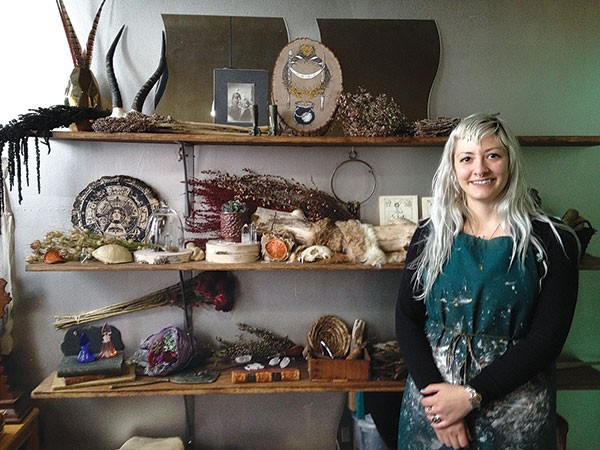On a balmy day in April, as the last vestiges of sunlight illuminate the dust that floats in the air of her Polish Hill studio, artist Adrienne Rozzi is thinking about spring more than most.
A track from Sisters of Mercy plays quietly, but persistently, from her MacBook. The faint scent of incense hangs in the air. Rozzi is in the process of creating the screen prints that will be featured in her first solo show, at Artisan gallery, in Garfield. Her art — which most often takes the form of sparse, haunting illustrations and screen prints — focuses on the subject matter and symbolism associated with pagan history, alchemy and the ways witches have been portrayed in different cultures. Her show will focus on May Day, the tradition that celebrates the arrival of spring.
Rozzi's interest in occult knowledge has long been a part of her life, though even her cursory investigation quickly revealed it to be widely misunderstood. From her self-directed study, she learned that the portrayal of occult knowledge in popular culture didn't capture its inherent subtleties and nuances.
"Magic in this world is not as fantastical as what it sounds like, but I think magic in this world can be anything that is a very strong coincidence or a universal consciousness," she says. "Everything I would study would always go back to ancient history and the ancient cultures. The tradition of witchcraft was not so frowned upon."
Though inspiration can sometimes be difficult for an artist to pinpoint, Rozzi's upbringing in rural New Castle, Pa., may have been the first intersection between her life and her interest in these ancient cultures that depended on the Earth for sustenance in a more direct way than we do today.
"I'm really interested in the relationship between people and nature, and how much it has changed since a very long time ago. I think there is something really special and magical in that relationship," she says. "I think with civilization evolving the way it has, we've lost touch with that."
"I grew up outside of the city," she explains. "We lived in a more rural area, so I'm used to having trees and grass and smelling the fresh spring air. You lose that in the city, but it almost makes it that much more special when you do immerse yourself in it again."
Rozzi's parents were artists and, as the youngest of three, she found unconditional support from them in her chosen career.
"Our whole lives, they were really supportive of the three of us doing art. When we were little, we would always sit down and draw each other," she says. "I was just so intrigued by the process of making. I just wanted to learn to make everything in the world."
Rozzi studied art history, studio art and film at the University of Pittsburgh. In 2010, armed with the knowledge she obtained at Pitt and the business lessons taught by stints working at The Andy Warhol Museum and a printshop internship, she launched Poison Apple Printshop. It offers prints, T-shirts and other ephemera emblazoned with Rozzi's illustrations of witches and occult symbols.
It was her work at Poison Apple that caught the attention of Mind Cure Records founder Mike Seamans, who recognized an authenticity in Rozzi's illustrations and commissioned her to provide artwork for the label.
"She was an easy person to collaborate with because we had a very similar aesthetic. I can relate to the references from which she draws," Seamans says. "While I may not know much about witchcraft, her imagery is part of a visual vocabulary that has come to be strongly associated with punk and heavy metal."
Rozzi was excited when she learned that her show would open on May 1, or May Day. The coming of spring and the allusions to birth offer a fitting parallel to Rozzi's very first solo show. May Day also fosters a spirit of community, the drawing together of disparate elements. This is best represented by the "May Wheel" she created as the centerpiece of her show.
According to information accompanying the piece in the show, "Wheels and magical circles have been used by magical practitioners dating back to ancient cultures. The wheel acts as a graphical microcosm of the universe itself and represents the sorceress' relation to her surroundings."
"I designed this wheel myself, choosing the subject matter and imagery by what is important to me about spring festivals from different cultures," Rozzi says.
"So many different cultures throughout history have celebrated the coming of spring and worshipped the Earth because of that," she says. "That's why I always like to mix the symbols. It shows that it's more universal."
Adrienne Rozzi's show runs through the end of May at Artisan, 5001 Penn Ave., Garfield.



















